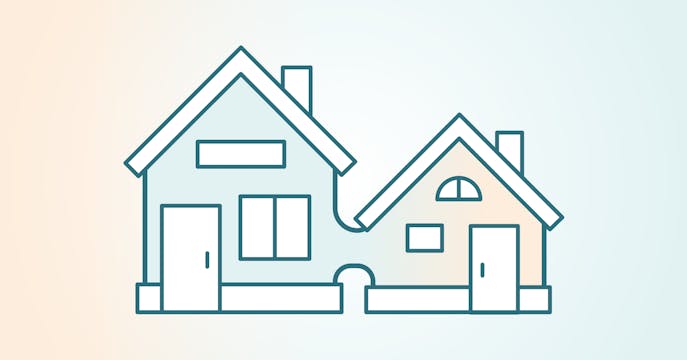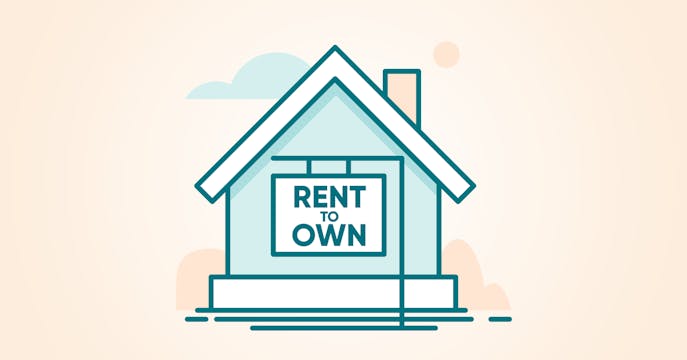Lowest Mortgage Rate in Canada. Starting from 2.49%
Is co-ownership the answer for an affordable mortgage?
To get your foot in the equity door, sharing a home and a mortgage is an intriguing alternative.
Thwarted by higher home prices and tight markets, some are seeing ownership in a new light — and trying creative (if not always easy) options to live in and own a home. Here's what to think about for co-homing.
Thinking about co-ownership? You'll have those roommates for a long time.
So you may as well be clear on the concept.
It's pretty typical to buy a house with a spouse, common-law partner, or a family member. But co-owning and co-living with non-family members has become a more popular idea in the face of sky-high prices, bidding wars, and now, higher inflation and higher rates. Plus, pandemic-imposed loneliness has enlightened some to their desire to be part of a closer-knit community.
Pooling resources to increase purchasing power may help:
- First-time home buyers get into a tight housing market
- Up the game for those interested in a larger property or a better neighbourhood
- Add a beneficial 'community' aspect of co-living in the same house (or on the same property)
Think you're easy to get along with? Over and above the idea of having roomies, if you're buying a house with friends, other couples, or even (partial?) strangers, entering into a mortgage with other people can be complicated and have serious financial repercussions if things go wrong. But under the right circumstances, successfully co-owning a home may get you in the real estate door months or even years earlier than going it on your own.
Maybe you already rent with people you like, or are confident a lawyer can set co-ownership rules well enough to make it work for you.
The real question is, can you get a lender on board? Here's what you need to know to help a co-ownership mortgage approval succeed.
Everyone will need to fit the (mortgage) bill.
The pros of a co-ownership mortgage mean you can combine savings for a bigger down payment, add everyone's income together for a higher pre-approval amount, and share the costs involved in buying and owning a home.
But before you can buy a home together, you'll need to get pre-approved by a lender.
Co-applying for a mortgage means that each party (whose income will be used to qualify) should have:
- Good credit standing (680 or higher)
- Reliable income sources for at least the past 2 years
- Qualifying debt-service ratios (less debt is better)
- A solid understanding of legal and financial obligations
- Legal plans in place for payment contingencies such as job loss, death, or if a co-owner decides to leave (a lender may ask for assurances of these details)
What type of joint mortgages are there?
A Joint Tenant structure is what married, common-law partners or close family members typically use, and they share equally the ownership of the property. In the event of death, ownership passes to the remaining owner(s).
Tenants in Common allows separate parties to jointly enter into a mortgage, and they each own a portion — which can be a different percentage based on financial contribution as outlined by a legal agreement. In the event of death, that share is passed on to a beneficiary or sold to the remaining owner(s).
Here's a comparison between Joint Tenants and Tenants-in-Common co-ownership options:
| Joint Tenants | Tenants in Common | |
|---|---|---|
| Typically for those buying as | Married or common-law couples; close relatives | Friends, couples, business partners, strangers |
| Listed on title | At least one owner listed | Typically all listed |
| Share of property | Equal ownership | Share portion can vary depending on agreement |
| Ownership after death | Automatically transfers to remaining co-owner(s) | Share transfers to beneficiary or next of kin; or sold to remaining co-owners |
| Purchasing power | May not increase if single income source used | Can increase by combining sources of income |
| Down Payment needed | 5% minimum depending on house price | Depending on details, lender may require 20% or more down payment |
| Default Insurance fees | Higher down payment means less fees | Higher down payment means less fees; insurance may not be applicable |
| Tax Benefits | For primary residents listed | For primary residents listed |
| Ability to walk away | Remaining owner(s) will need to re-qualify; subject to penalties; owners may not be allowed out of mortgage contract | Remaining owner(s) will need to re-qualify; subject to penalties; owners may not be allowed out of mortgage contract |
| Permission for refinance or foreclosure | Required by all on title | Required by all on title |
| Effect on your credit score | Missed payments affect all on title | Missed payments affect all on title |
So, can you buy a home with just anyone?
As you can see from the above chart, you can technically enter into a co-ownership with just about any legal-age adult, depending on financial, legal and mortgage-qualifying details. If you can't get approved by a lender, the whole thing is a no-go.
How can co-owners get pre-approved for a mortgage ?
HERE'S THE TRICKY PART. Each person (or couple) whose income will be used should have a strong application. A lender will want an explanation of why there are multiple owners applying and to be assured they will receive their money if something happens — they may not be on board depending on the details. A lender who specializes in or works with co-ownership mortgages may be 'friendlier' to your application and ask fewer questions.
If someone has a weaker credit score or higher debt load, you may not be able to use them for the pre-approval or the final approval (or the lender may want further assurances). In this case, their income and down payment may still be used towards the purchase and other costs, with their financial obligation clearly outlined through legal means.
Having solid agreements in place to ensure everyone pays their part (and is entitled to their proper share) can help lenders assess your co-ownership mortgage for pre-approval.
Flexible mortgage options
Considering that more than one party will be part of the mortgage, having flexible mortgage options can help save money and time if a change is needed down the road.
For example, if someone gets married and wants out, or leaves town with a new job, a variable-rate mortgage will cost less in refinance penalties compared to a fixed-rate mortgage. But a fixed rate will also guarantee that the payments won't increase during the term, which may also be a deciding factor for your group.
Keep in mind that if someone does leave the agreement, everyone left on the mortgage will need to re-qualify. If they don't meet the lender requirements, the 'leaving' party will not be allowed to exit the mortgage agreement, will still be liable for missed payments, and will continue to carry the mortgage loan on their credit report.
Can you still get a good rate for a co-ownership mortgage?
Getting True North Mortgage's lowest advertised rates depend on your mortgage qualification factors and the federally-required stress test. But because a co-ownership mortgage is an 'outside the box' situation, it ups the possible risk for a lender, and the rate you get might be higher.
That doesn't mean you can't get a good rate, but it will depend on your situation — whether you'll need mortgage default insurance, and the qualifying details of everyone involved.
Can you still get access to first-time home buyer rebates and programs?
If you're a first-time buyer, but someone else on the mortgage isn't, you may have reduced access to provincial or municipal rebates, depending on the province in which the house will be purchased. Government programs and rebates may still apply. An expert mortgage broker can help you determine what will work for your situation.
So maybe you can. But should you buy with others?
Well, that's a whole other discussion. Finding compatible roomies to share your investment, and your life (for however long) can help turn your co-owning strategy into a successful venture.
The pandemic changed many things. How we look at our own spaces, who we want to share those spaces with, and how the affordability of homes may factor into our financial futures — and it has forced many to look at 'traditional' ideas, like owning a home, in a new light.
There's nothing wrong with challenging the status quo, and determining a different course for attainting home ownership. The important thing is to do it your way, for your situation (assuming a lender is onboard with that). One smaller step towards home ownership now may help you achieve your goals, later.
Thinking of co-homing? Talk to us.
Talk to us first to help you decide if a co-ownership mortgage will work for you.
Whether you're one, or many — we can take a look at the numbers, help you understand what docs and details you'll need to both pre-approve and then qualify for the mortgage you'll need. We can check your lender and rate options, for the right fit for your situation.
No matter where you are in Canada, we can help you figure it out. Drop by a store location, give us a shout, apply online, or click the chat bubble to get started.
More FAQs about Co-Ownership Mortgages
Yes. The entire mortgage loan will be listed on your credit report and will be factored into future loans and credit extended by other lenders or financial entities.
For your own protection, yes. An experienced real estate lawyer will be able to draw up an agreement to help with events you may not foresee, and set out contract details for all involved that can inform any future decisions or questions that may arise.
As well, a lender will likely want assurances that certain details are outlined for future payment consistency.
We can provide a reference if needed, based on long-standing, trusted relationships within the mortgage industry.
If someone wants out, all on title and the mortgage contract will need to provide permission to refinance or sell the property.
For a refinance, the remaining co-owners will need to be re-qualified for the mortgage loan. If they do not meet lender requirements, the leaving party will not be allowed out of the mortgage contract even if they no longer reside in the home. They will still be liable for missed payments or default, and will carry the loan on their credit report, which may affect their future purchases.
If someone new is added, again, the re-qualification (refinance) process will apply.
Yes. Missed payments will affect all parties listed on the title and on the mortgage contract.
As far as the lender is concerned, each co-owner listed is 100% liable for the entire mortgage loan, no matter their share percentage. Entering into a mortgage contract is one of the biggest financial commitments you'll make, and a lender needs to be assured it will receive payment for the loan it has extended, and therefore looks at each party as equally responsible.
A legal agreement that outlines your share percentage will have impact on how much you'll initially invest, and how much equity (or loss) you'll have upon sale of the home.
You can look at selling or perhaps bringing in a new party to increase your chances of re-qualification and staying put.
There may be extra costs or fees for a professional legal agreement to help protect all owners involved.
With a lender, there may be added fees to deal with the extra work involved for your co-ownership mortgage. There may also be a higher interest rate, and therefore higher monthly payments, depending on the lender, purchase price and down payment amount. However, the pooling of resources and sharing of other costs in general may help offset the added expenses.
Depending on your legal agreement, you may also need to share any penalties incurred if someone leaves the mortgage contract and a refinance occurs.
There may be companies in your area that offer advice, or that may even help with the match-making process to co-buy a house. We suggest doing thorough research before contacting a company, or entering into any agreement.
Need to think outside the (mortgage) box? Connect with us for better rates and real answers.
More mortgage options

Multigenerational Mortgages
Buying with family may help you afford a home and share other perks.

What's the difference between a guarantor and a co-signer?
Need help securing a mortgage approval? One of these supporting roles assumes more risk.

Can you Rent to Own a home?
Buyer (as a renter), beware — know your risks for this pathway to ownership.

